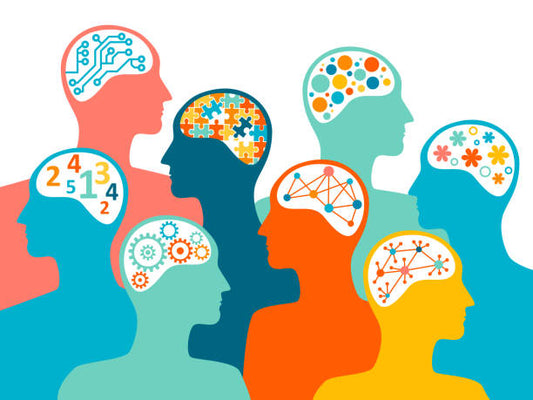Grief is a universal experience that touches everyone at some point in life. It can be one of the most challenging and traumatic experiences to navigate. Understanding the stages of grief can provide valuable insight into this complex emotional process and help you cope more effectively. This article explores the seven stages of grief and offers guidance on managing each stage. For more comprehensive support, consider enrolling in Amen University’s course, “Overcome Anxiety, Depression, Trauma, and Grief”.
Understanding the 7 Stages of Grief
American-Swiss psychiatrist Elisabeth Kübler-Ross first introduced the concept of the stages of grief in the 1960s with her five-stage model. Over time, this model has evolved to include seven stages, acknowledging the complexity and individual nature of grief. It's important to note that these stages are not linear and can overlap, with people experiencing some stages multiple times or skipping others altogether.
The 7 Stages of Grief
1. Shock
Shock is often the initial reaction to loss. Even if the loss was anticipated, the reality can still be jarring. During this stage, you might feel numb or detached from your emotions. This numbness acts as a natural emotional buffer, allowing you to slowly process the reality of the loss.
Coping Tips:
- Acknowledge Your Feelings: Recognize that feeling numb is a normal response.
- Seek Support: Reach out to loved ones or support groups to share your initial reactions.
- Maintain Routine: Stick to daily routines to help ground yourself during this disorienting time.
2. Denial
Denial is a defense mechanism that helps buffer the immediate shock of the loss. You may feel as though the loss isn’t real or that it hasn’t fully happened. This stage can include a mental fog, forgetfulness, and an inability to focus.
Coping Tips:
- Talk About Your Loss: Share your thoughts and feelings with someone you trust.
- Write It Down: Journaling can help process your emotions and make the loss feel more real.
- Stay Connected: Engage with friends and family to avoid isolation.
3. Anger
Anger is a natural response to feelings of helplessness and frustration. It can be directed at oneself, others, or the situation itself. It's important to find healthy ways to express this anger and not bottle it up.
Coping Tips:
- Express Your Emotions: Find healthy ways to express your anger, such as talking to a trusted friend or engaging in physical activity.
- Practice Patience: Understand that anger is a normal part of the grieving process.
- Seek Professional Help: A therapist can provide a safe space to explore and express your anger.
4. Bargaining
Bargaining often involves making promises to oneself or a higher power, seeking a way to reverse or lessen the loss. This stage can include thoughts of "what if" and "if only" as a way to regain control and make sense of the loss.
Coping Tips:
- Talk About It: Share your thoughts and feelings with someone you trust.
- Write It Down: Journaling can help process your emotions and make the loss feel more real.
- Seek Professional Help: A therapist can provide a safe space to explore and express your anger.
5. Depression
Depression is a natural response to significant loss. This stage can involve deep sadness, isolation, anxiety, and a sense of dread. It might feel like the suffering is too much to bear.
Coping Tips:
- Seek Professional Help: Consider talking to a therapist or counselor.
- Stay Connected: Don’t isolate yourself; spend time with friends and family.
- Self-Care: Ensure you’re eating well, getting enough sleep, and exercising.
6. Acceptance and Hope
Acceptance is about coming to terms with the reality of the loss. It doesn’t mean all the pain is gone, but you begin to find a way to live with it. Hope gradually re-emerges as you start to see a path forward and begin to re-engage with life.
Coping Tips:
- Set Goals: Create small, achievable goals to help regain a sense of purpose.
- Engage in Activities: Participate in activities that bring you joy and fulfillment.
- Stay Connected: Continue to seek support from loved ones and support groups.
7. Processing Grief
Processing grief involves integrating the loss into your life and finding ways to move forward. This stage can include expressing your grief through words, art, or other creative outlets, connecting with support groups, and practicing self-care.
Coping Tips:
- Creative Outlets: Use art, music, or writing to express your grief.
- Community Support: Join support groups to connect with others who understand your experience.
- Self-Compassion: Be kind to yourself and allow yourself to feel a range of emotions.
The Importance of Support
Grieving is a journey that no one should undertake alone. Support from friends, family, and professionals can make a significant difference. Sharing your grief with others can provide comfort and understanding, helping you feel less isolated.
Additional Tips:
- Face Your Feelings: Acknowledge and express your emotions as they come.
- Maintain Hobbies and Interests: Engaging in activities you enjoy can provide comfort and a sense of normalcy.
- Look After Physical Health: Prioritize sleep, nutrition, and exercise to support emotional well-being.
- Plan for Grief Triggers: Be prepared for emotional responses during anniversaries or significant events.
Conclusion
Grieving is a deeply personal and often challenging process. Understanding the stages of grief and knowing what to avoid can help you navigate this journey more effectively. Remember, there is no right or wrong way to grieve, and it’s important to give yourself time and patience. For comprehensive support and guidance, consider enrolling in Amen University’s course, “Overcome Anxiety, Depression, Trauma, and Grief”. This course offers valuable insights and strategies to help you cope with loss and move towards a more hopeful future.
By embracing the grieving process and seeking support, you can find new meaning and eventually move on with your life.








